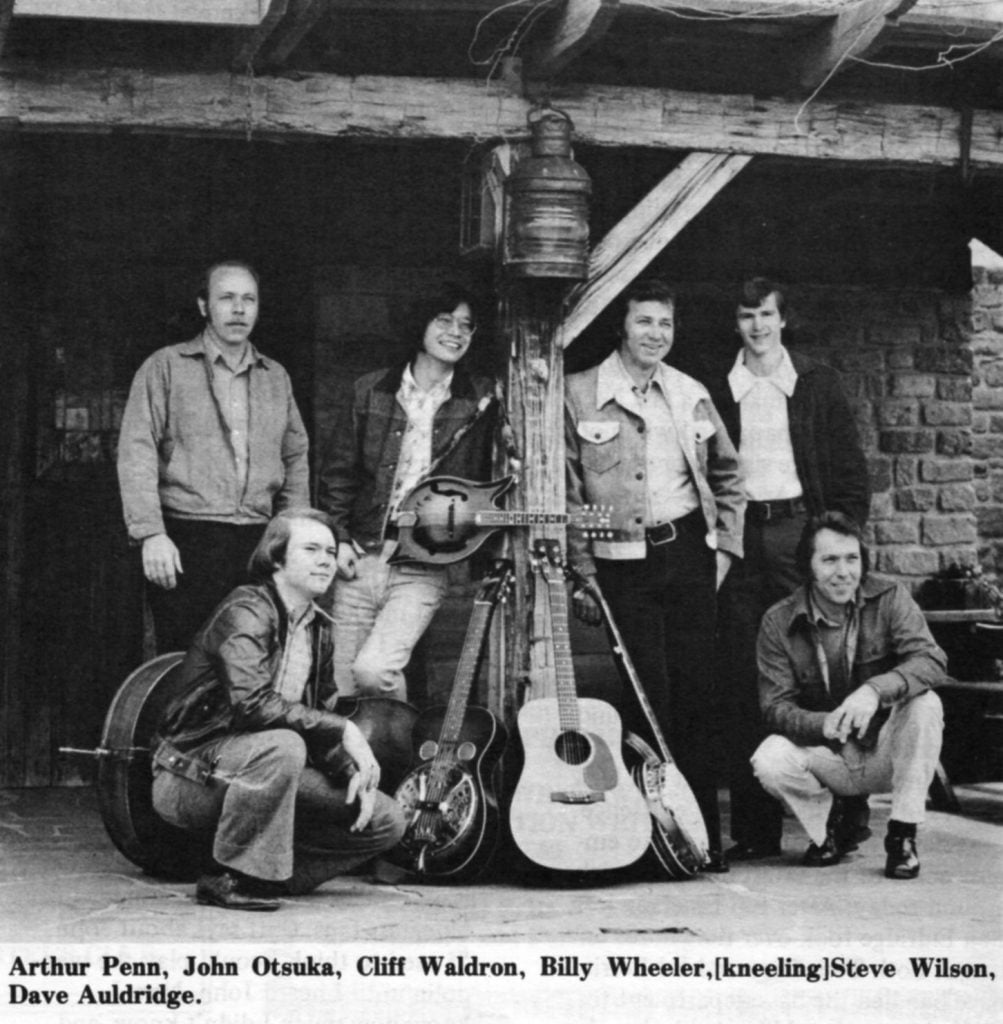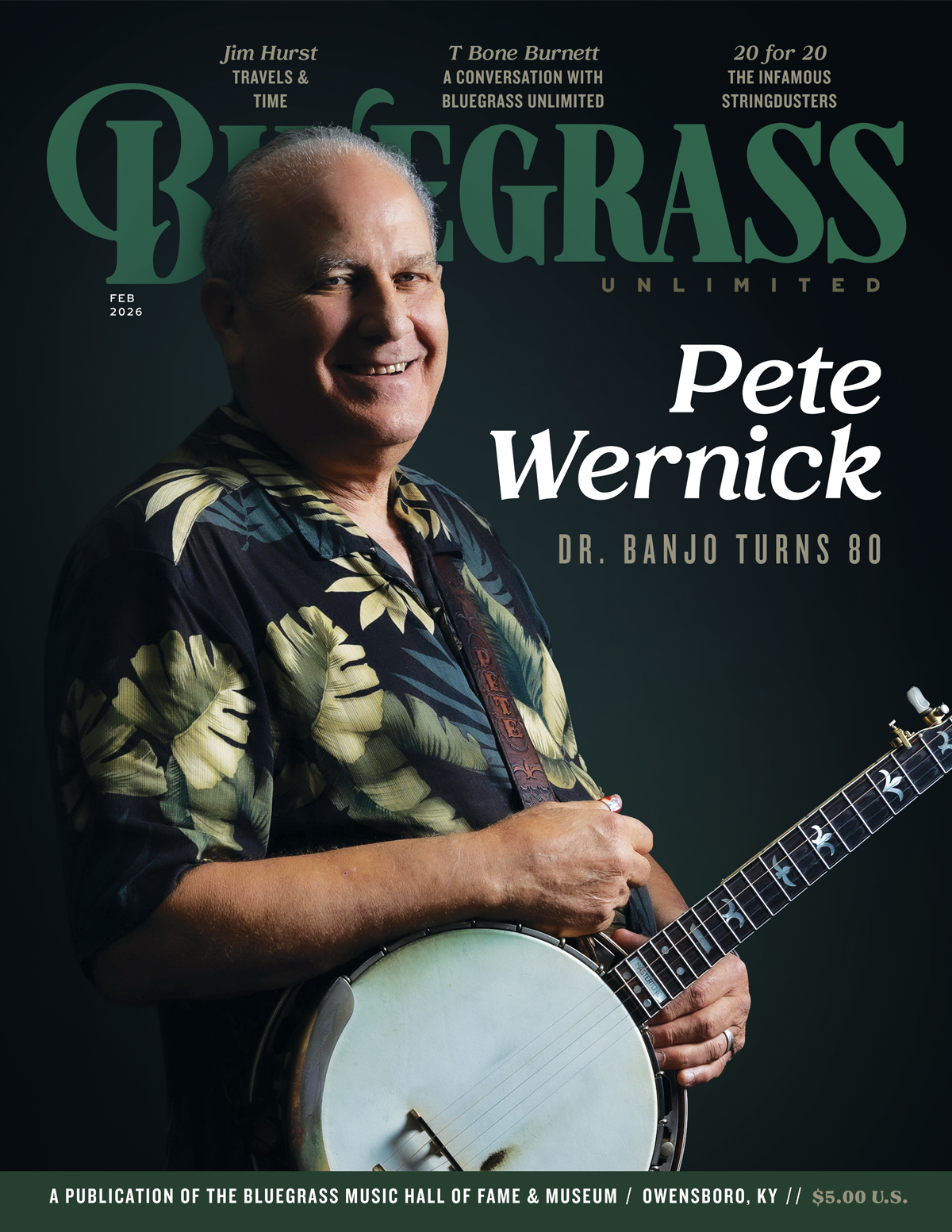Home > Articles > The Archives > Cliff Waldron and the New Shades of Grass
Cliff Waldron and the New Shades of Grass
Reprinted from Bluegrass Unlimited Magazine
May 1974, Volume 8, Number 11
“I never was much of a believer in astrology until last winter, when I read horoscope and it said I was going to have a good spring. Well, now it’s spring, and things are going so good, I guess there’s something to be said for this astrology business.”
Cliff Waldron, founder and leader of The New Shades of Grass, is a true Aries. With fire as his element, Cliff burns with an inner flame of energetic determination. There is nothing he can’t do, nothing he won’t try. “I like to keep my shows moving. Every song is going to be really different from the last,” Cliff says. “It’s even hard to tell on stage what’s going to happen next. But if this going to work right, you’ve got to have a good band.”
In addition to being good, they are, in age, background, and personality, as different and varied as the music they play. Cliff has put together a group of musicians who excel in playing the kind of music Cliff Waldron has become known for. Using all acoustic instruments, they are equally at home in the traditional biuegrass fields of “Little Maggie,” through the bluegrass standards like “Fox on the Run,” (which, by the way, Cliff was the first to record) to such to such modern popular-bluegrass as “If I Were a Carpenter.”
Innovation has always been the focal point of The New Shades of Grass. Cliff has used country music, popular music, and soft rock to broaden his appeal.
“I suppose, given my choice, traditional bluegrass is what I’d prefer to listen to. Traditional music certainly has it’s place today, but there’s only a few groups left that can get by on just traditional music. I like to sing the modern stuff, too. Some of my favorite writers are Kris Kristofferson, Merle Haggard, and Gordon Lightfoot. I guess I was the first to record many modern writers’ songs in bluegrass form. But as for music, I have to say, it doesn’t really matter what name you give it, if it’s good music, I’ll like it.”
Cliff cut his teeth in bluegrass in the traditional way. As a youngster, he listened to Bill Monroe, the Stanley Brothers, and Flatt and Scruggs on radio and records back home in Jolo, W.Va. “I guess I must have been influenced a lot by Monroe,” Cliff says, “and I learned to play mandolin before I learned guitar. Oh, I had an old, beat-up guitar I used to fool around on, but everybody I knew in West Virginia played the guitar, and if I wanted to play along with them, I had to learn something else. I reckon that’s why I took up the mandolin. When I moved up to the Washington, D.C. area I started playing the guitar again, and now I hardly ever even pick up the mandolin.”
It was in the mid 1960’s when Cliff moved to the Washington, D.C. area.
For several years, he was a regular visitor to the many bluegrass shows around Washington. But when he joined forces with banjo-picker Bill Emerson in the late 60’s, audiences became aware that a new star was beginning to rise on the bluegrass horizon. They were soon signed by Rebel Records and over the years, the quality of the group known as The New Shades of Grass, a name chosen from the title of the first album, has continued to make its mark for the label. They have, in fact, just recorded their tenth album for Rebel.
“It hasn’t come easy,” Cliff admits. “It sure hasn’t all been a rose garden. Actually, it’s been more like an elevator, there’ve been so many ups and downs.
A few years ago, bluegrass music only appealed to certain kinds of people. There wasn’t too large a market for our kind of music. Now every little club and restaurant in every big city and country crossroads has its own favorite house bluegrass band. Now you can’t afford to just be average, you have to really be something special just to stay in the running. But this competition has been good for all of us in bluegrass. It keeps us on our toes and always looking for something different to appeal to our fans.
One of Cliffs most outstanding and necessary qualities is his total devotion to playing and singing good bluegrass music. This is especially important today, with so many up-and-coming young musicians trying to please their audience instead of making a fast buck in bluegrass, as has happened when other forms of music were rising in popularity. Cliff, with true Arian determination, has always sought out the best songs for his style, and the best musicians for his band. “My idea of the perfect bluegrass band would have a guitar, banjo, mandolin or fiddle, bass, and Dobro,” Cliff says. “I’m really happy with the group I have now. We’ve got it all and then some.”

During the four years that the New Shades of Grass has been in existence, Cliff has consistently managed to employ some of the finest bluegrass pickers around today. After Bill Emerson left, Ben Eldridge took over the chores on banjo. Both Tom Gray and Ed Ferris have handled the bass department for Cliff. At one time Mike Auldridge played the Dobro with the New Shades of Grass, and Bill Poffinberger was the fiddle player until his retirement early last summer. Both Gene Johnson, of the IInd Generation, and Dave Auldridge have picked the mandolin with the New Shades. Still with the New Shades of Grass after many years, though now playing rhythm guitar and singing tenor, is a familiar name to bluegrass fans, Dave Auldridge. Dave, who comes from Kensington, Md., is known to the rest of the group as “smilin’ Dave,” because, although he does have a good sense of humor, he seldom smiles. “I like the style of music we play,” Dave says, “and I really feel that Cliff’s voice and mine blend together well. Another reason I like playing for Cliff is that you don’t really play for Cliff. It’s a very democratic group. Everybody is fairly treated, and gets a fair share in both the decision-making and the profit.”
John Otsuka is perhaps one of the best mandolin players in bluegrass today. John, who came to this country from Kobe, Japan as part of the Bluegrass 45, has simply gotten better and better over the years. “In Japan, at the Universities, there are what we call Tight music’ clubs,” John explains. “When I was young, one of my older brothers was in a ‘light music’ society at his university, and it was through him that I got interested in bluegrass.
I learned the mandolin when I was 14- years-old, and continued to play all through my four years in college.”
John, who has a degree in commerce, is extremely popular with American bluegrass fans. Cliff says about John, “I used to think I could play the mandolin until I heard John. Now I know how much I didn’t know, and how good he really is.”
Arthur Penn, bass player with the New Shades of Grass, agrees with Cliff. “I feel the same way,” Art candidly admits. “I never realized how much I didn’t know about music at all until I started playing with this group. Now I learn something new every time we go on stage.”
17-year-old Billy Wheeler, one of the new breed of bluegrass musicians, is a tall, good-looking banjo picker who stands silently on stage, picking a forceful, driving style of banjo. Cliff feels that Billy is one of the finest banjo players in the business today. “He can pick with the best of them,” Cliff says, “and more likely than not he’ll come out on top every time.”
The newest and youngest member of the New Shades of Grass is a 16-year- old Dobro player from Lynchburg, Va. Steve Wilson. Steve, known as “the Lynchburg Flash,” is the personality kid in the group. He has only been playing the Dobro for two years, and it boggles the mind to think how good he’ll sound in another two years. The addition of a good Dobro player to the group has rounded out the sound and provides the New Shades of Grass with the kind of music that appeals to all tastes of all fans.
When he isn’t playing bluegrass. Cliff is most likely to be found somewhere out in the woods, hunting or fishing, his two favorite hobbies. “I’m still a country boy at heart,” Cliff says. “Someday I’d like to retire to a cabin somewhere back in the Blue Ridge Mountains, although I know I’ll never be able to give up playing bluegrass. And I’ve still got a lot of things to do and places to go before I’m ready to go back to the mountains.”
“I used to have two goals, back when I was just starting. They were to make an album and own a bus for the band to travel. Well, now that I’ve done both of those things, I have a new goal, and that’s to have the best band in bluegrass music. You know, the more I hear the band I’ve got now, and the more we play together, shucks, I hope we’re well on the way.”
Share this article
1 Comment
Leave a Comment Cancel Reply
This site uses Akismet to reduce spam. Learn how your comment data is processed.

As newlyweds, my wife and I moved to the DC area in 1970, and immersed ourselves in the bluegrass scene there. We often enjoyed Cliff and the New Shades at the Red Fox Inn. Along with another couple, we tried our amateur hands at some of their tunes with more enthusiasm than skill. We still have handwritten scores for several of those songs from our “golden age of bluegrass.” One of them is “Teardrops Will Kiss the Morning Dew.” I THINK that it may have been done by CW and TNSOG, but we can’t find it on any of our old vinyls, or on the iTunes store. Can you confirm or deny that they did it?!
Many thanks and many thanks for all that memorable music.